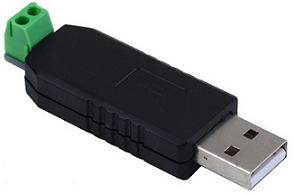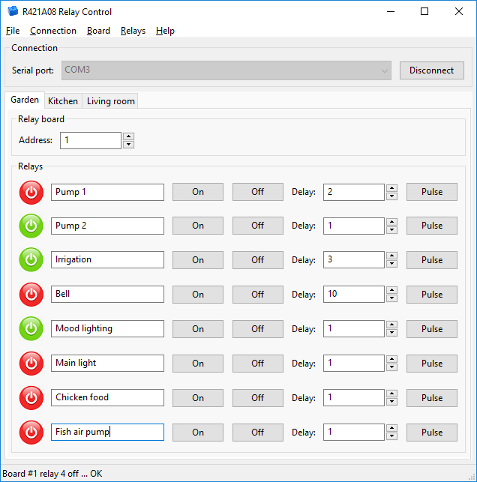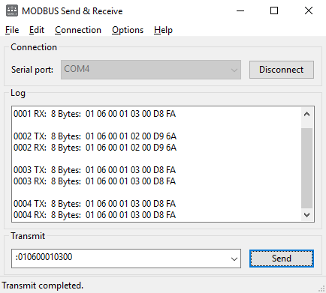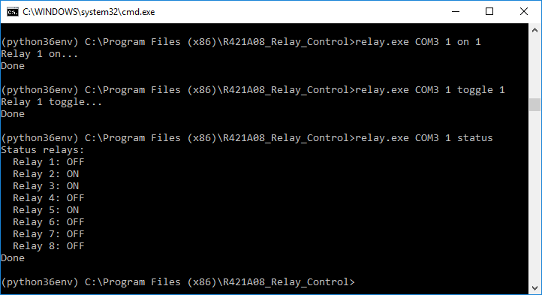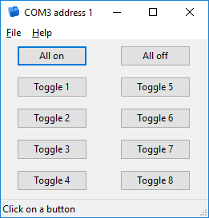This Python project can control up to 64 individual 8 channel R421A08 relay boards from the command line and GUI. It uses a universal USB - RS485 dongle.
- Python packages for easy application integration.
- Simple command line interface, useful for scripting.
- wxPython GUI tested with Python 3.5 only (Windows 10 and Ubuntu 16.04)
- Unit tests with coverage.
The following hardware is required for this project:
- One or more R421A08 relay boards.
- RS485 - USB dongle.
- Optional: A second RS485 - USB dongle to monitor MODBUS frames.
- RS485 (binary) interface.
- 8 x 12V Relays: 10A 125VAC / 10A 28VDC.
- 8 status LED's.
- 6 DIP switches for 64 board addresses.
- Board power: 12V DC.
- Current board idle: ~11mA.
- Current one relay: ~26mA.
- Current all relays on: ~220mA.
- Length: 90mm, width: 60mm, height: 20mm.
WARNING: DO NOT USE THIS RELAY BOARD WITH 230V AC!
The distance between relay traces on the PCB are < 2mm without holes for isolation. This is dangerous when using it with high voltages. See the picture above.
The 16 relay board version works by changing NUM_RELAYS = 16 in R421A08.py as reported by a user in issue #1.
This project requires a RS485 - USB dongle which is widely available, for example:
- On Windows, open the
Device Manager|Ports (COM & LPT)to find theUSB-SERIAL CH340 (COMxx)serial port. - On Linux, use the
dmesgcommand to find the serial port, such as/dev/ttyUSB0.
import time
import relay_boards
if __name__ == '__main__':
print('Getting started R421A08 relay board\n')
# Create MODBUS object
_modbus = relay_modbus.Modbus(serial_port=SERIAL_PORT)
# Open serial port
try:
_modbus.open()
except relay_modbus.SerialOpenException as err:
print(err)
sys.exit(1)
# Create relay board object
board = relay_boards.R421A08(_modbus, address=1)
print('Status all relays:')
check(board.print_status_all())
time.sleep(1)
print('Turn relay 1 on')
check(board.on(1))
time.sleep(1)
print('Turn relay 1 off')
check(board.off(1))
time.sleep(1)
print('Toggle relay 8')
check(board.toggle(8))
time.sleep(1)
print('Latch relays 6 on, all other relays off')
check(board.latch(6))
time.sleep(1)
print('Turn relay 4 on for 5 seconds, all other relays off')
check(board.delay(4, delay=5))
time.sleep(6)
print('Turn relays 3, 7 and 8 on')
check(board.toggle_multi([3, 7, 8]))
time.sleep(1)
print('Turn all relays on')
check(board.on_all())
time.sleep(1)
print('Turn all relays off')
check(board.off_all())
time.sleep(1)Please refer to the Wiki page for installation and usage.
MODBUS Application Protocol Specification v1.1.b
The following Python packages are available in this project:
- R421A08 relay board Python package:
- Read state relay(s).
- Turn relay(s) on.
- Turn relay(s) off.
- Toggle relay(s).
- Latch relay (One relay on, rest off).
- Momentary (Turn relay on for one second).
- Delay (Turn relay on for 1..255 seconds).
- Single or multiple relay boards.
- Serial MODBUS Python package:
- MODBUS monitor frames on the RS485 bus
- Send raw ASCII MODBUS frames
MODBUS is an open binary serial communication protocol, mainly used for PLCs.
- Serial port at 9600 baud, 8 databits, 1 stop, no parity.
- This board supports MODBUS RTU protocol only.
- This board supports 64 addresses, configurable with 6 DIP switches.
- This board does not support ASCII mode, but can be send with the Python
--sendoption. - This board does not support AT commands.
- This board does not support broadcasts.
- All relays are off after power-on.

